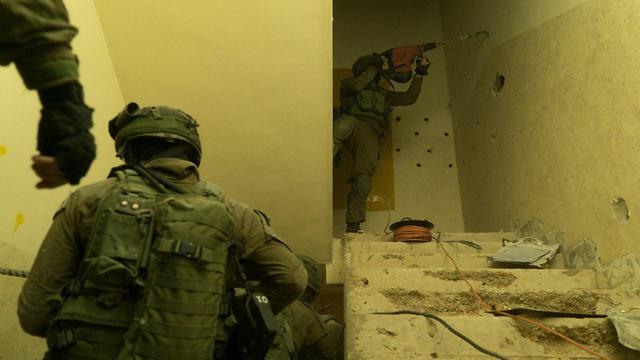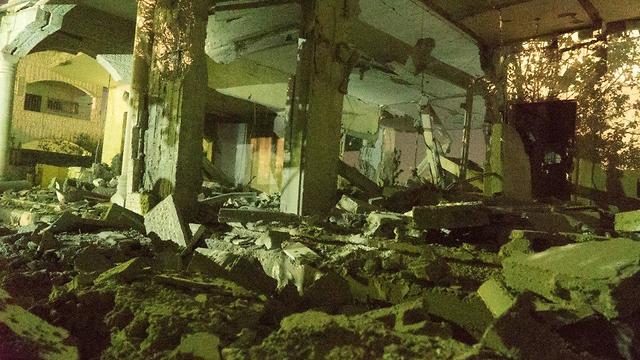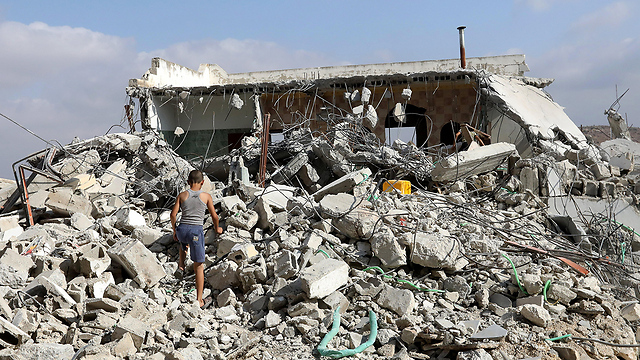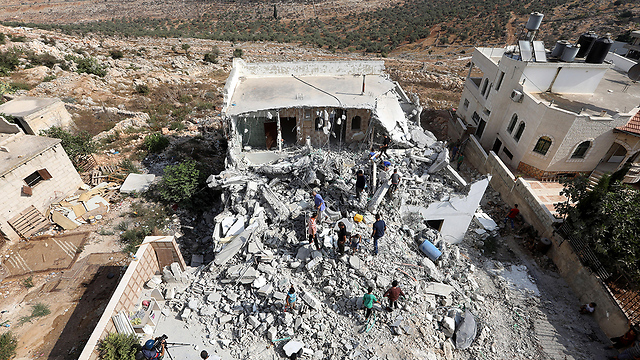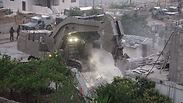
Explaining the delay in terrorist home demolitions
Despite the government decision to expedite the demolition of terrorists' houses, the procedure still takes months to complete, but security official says not all cases are ‘black and white’.
During the second intifada, territorial brigade commanders had the authority to order the demolition of terrorists' houses within 24 hours from the attack. But today, the average time it takes to demolish the house is months, with legal contraints serving as the main obstacle.
According to the IDF, 35 terrorists' homes were demolished while five others were sealed between 2015 and 2017. So far in 2018, four houses have been demolished and one sealed, with three other demolitions pending.
The three include the home of the terrorist who murdered Yotam Ovadia two-and-a-half weeks ago in the settlement of Adam, the home of the terrorist who murdered Duvdevan soldier Staff Sgt. Ronen Lubarsky two-and-a-half-months ago, and the home of the terrorist who murdered Adiel Kolman at the Lion's Gate in Jerusalem some five months ago.
A legal battle is being waged on the third case, with the terrorist's family submitting objections to the demolition.
In recent years, there has been a significant decline in the number of actual demolition of terrorists' homes. The National Union faction in Bayit Yehudi party has turned several times to Dina Poliak, the Ministry of Defense's Freedom of Information officer, as well as to the Public Security Ministry, the Israel Police and the IDF, asking why many terrorists' homes have yet to be razed.
One of the prominent cases that failed the legal test is that of the terrorist who murdered three members of the Salomon family in Halamish about a year ago. Since the attack, in tandem with the criminal trial against the terrorist, the Salomon family has been waging a legal battle for the demolition of the stabber's home in the village of Kobar.
The Salomon family's legal struggle shows that protracted judicial proceedings essentially nullify the effectiveness of demolishing terrorists' houses as a deterrence policy against further terror attacks.
Following the attack, the IDF quickly made the decision to demolish the first floor of the murderer's house, but left the floor and the stairs leading to the second floor standing.
The Salomon family petitioned the High Court of Justice demanding that the entire structure be demolished, making it impossible to construct other building on the ground.
A moment before the court's ruling, it became clear that the terrorist's family had rebuilt the second floor and asked not to destroy it. The court rejected the Salomon family's petition, leaving the second floor in place.
"We cannot say for certain that demolishing terrorists' houses has lost its effectiveness, but the facts speak for themselves," said a source familiar with the details of the case.
"The terrorist who murdered the late Yotam Ovadia in Adam came out of the same village. There are those who will say that this case shows that demolishing terrorists' houses has lost its effectiveness in preventing terror attacks," the source added.
The National Union submitted a query to the Defense Ministry regarding the matter.
"For months we have been trying to get an answer regarding the destruction of the terrorists' homes. Unfortunately the answer is that we are being tossed around, from one official to the next without getting a real answer," says National Union party's chairman, Ofir Sofer.
"It must be understood that the destruction of terrorists' homes is an important tool in the fight against terror. We demand answers and severe measures to be taken against terrorism," Sofer proclaimed.
According to government's policy, the demolition of a terrorist's home is carried out only if the terrorist is a Palestinian, not an Arab-Israeli, who has taken the life of an Israeli.
In cases in which an Israeli victim is critically injured or paralyzed, the terrorist's house is not destroyed.
Several official bodies are involved in the demolition process, while, generally, the person who oversees the operation and initiates the decision is the legal advisor of the Judea and Samaria Division.
Only a few hours after every attack, the legal advisor begins procedures for a house demolition. A day or two later, IDF forces raid the terrorist's house and put the necessary preconditions in place. First, they map the structure and take measurements, and in less than a week a professional opinion offering different demolition plans is formulated.
Afterwards, the Shin Bet submits a security report regarding the demolition procedure, which is usually submitted at a relatively advanced stage of the procedure after a sufficient amount of evidence is collected that unequivocally proves the terrorist’s motives, in case the terrorist's family attempts to claim otherwise.
The two aforementioned steps usually last for up to one month, and include a filing of the case that includes expert opinions from security officials and engineers, intended for approval and examination of the Ministry of Justice and the attorney general.
Only following the approval, the security forces are able to present a letter to a terrorist’s family, informing them of the demolition. Usually, once an IDF overview is submitted, it is initially rejected due to preliminary preparations, and less than a week after, the terrorist’s family is issued with another notice, 72 hours ahead of the demolition. During that time period, the family has the right to appeal to the Supreme Court.
Generally speaking, the High Court of Justice does not tend to intervene and allows the demolition after an accelerated hearing. However, there have been instances when the court has ruled that only an area of the house previously occupied by the terrorist can be demolished.
“It is not all black or white in these cases and there are complexities … Sometimes the terrorists are minors and the house they lived in is owned by their family, or they lived in a room in an apartment in a six-story residential building in the middle of a crowded village. So what do you do? Demolish the whole building? Cause collateral damage to the rest of the families who live in the same building?” explained one security source.
Since the policy on the issue has been updated by the Security Cabinet, all the bodies involved in the procedure have been asked to put this as their top priority, similar to the Palestinian Authority's tendency to immediately assist the families whose houses have been demolished, by providing them with fully furnished and equipped apartments.










